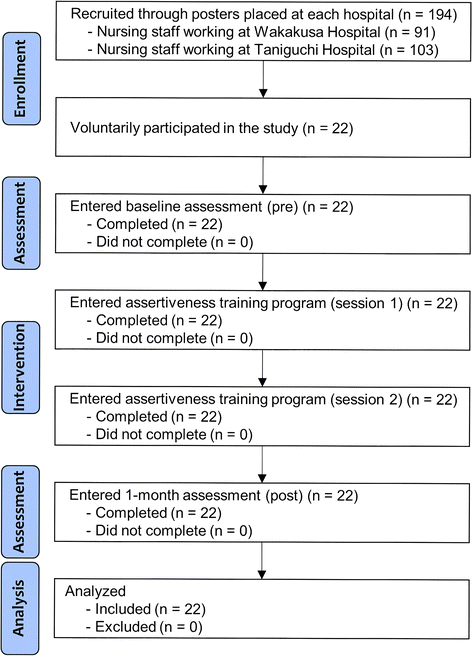Development and evaluation of a modified brief assertiveness training for nurses in the workplace: a single-group feasibility study
- PMID: 28592922
- PMCID: PMC5461750
- DOI: 10.1186/s12912-017-0224-4
Development and evaluation of a modified brief assertiveness training for nurses in the workplace: a single-group feasibility study
Abstract
Background: Effective communication has a great impact on nurses' job satisfaction, team relationships, as well as patient care/safety. Previous studies have highlighted the various beneficial effects of enhancing communication through assertiveness training programs for nurses. However, most programs take a long time to implement; thus, briefer programs are urgently required for universal on-the-job-training in the workplace. The purpose of this feasibility study was to develop and evaluate a modified brief assertiveness training program (with cognitive techniques) for nurses in the workplace.
Methods: This study was carried out as a single-group, open trial (pre-post comparison without a control group). Registered nurses and assistant nurses, working at two private psychiatric hospitals in Miyazaki Prefecture in Japan, were recruited. After enrolling in the study, participants received a program of two 90-min sessions with a 1-month interval between sessions. The primary outcome was the Rathus Assertiveness Schedule (RAS), with secondary measurements using the Brief Version of the Fear of Negative Evaluation Scale (BFNE) and the Brief Job Stress Questionnaire (BJSQ). Assessments were conducted at baseline and after a 1-month interval (pre- and post-intervention).
Results: A total of 22 participants enrolled in the study and completed the program. The mean total score on the primary outcome (RAS) significantly improved from -12.9 (SD = 17.2) to -8.6 (SD = 18.6) (p = 0.01). The within-group effect size at the post-intervention was Cohen's d = 0.24; this corresponds to the small effect of the program. Regarding secondary outcomes, there were no statistically significant effects on the BFNE or any of the BJSQ subscales (job-stressors, psychological distress, physical distress, worksite support, and satisfaction).
Conclusions: This single-group feasibility study demonstrated that our modified brief assertiveness training for nurses seems feasible and may achieve a favorable outcome in improving their assertiveness. Further controlled trials with longer follow-up periods are required in order to address the limitations of this study.
Keywords: Assertiveness; Assertiveness training; Education; Nurse; Workplace.
Similar articles
-
Is modified brief assertiveness training for nurses effective? A single-group study with long-term follow-up.J Nurs Manag. 2018 Jan;26(1):59-65. doi: 10.1111/jonm.12521. Epub 2017 Jul 25. J Nurs Manag. 2018. PMID: 28744987
-
The effectiveness of assertiveness training program on psychological wellbeing and work engagement among novice psychiatric nurses.Nurs Forum. 2020 Jul;55(3):309-319. doi: 10.1111/nuf.12430. Epub 2020 Feb 7. Nurs Forum. 2020. PMID: 32034762
-
Feasibility and outcomes of paid undergraduate student nurse positions.Nurs Leadersh (Tor Ont). 2006 Sep;19(3):e1-14. doi: 10.12927/cjnl.2006.19032. Nurs Leadersh (Tor Ont). 2006. PMID: 19830923
-
[A group cognitive behavioral intervention for people registered in supported employment programs: CBT-SE].Encephale. 2014 Jun;40 Suppl 2:S81-90. doi: 10.1016/j.encep.2014.04.005. Epub 2014 Jun 16. Encephale. 2014. PMID: 24948482 Review. French.
-
Usage of the Brief Job Stress Questionnaire: A Systematic Review of a Comprehensive Job Stress Questionnaire in Japan from 2003 to 2021.Int J Environ Res Public Health. 2023 Jan 18;20(3):1814. doi: 10.3390/ijerph20031814. Int J Environ Res Public Health. 2023. PMID: 36767182 Free PMC article.
Cited by
-
Game-Based Promotion of Assertiveness to Mitigate the Effects of Bullying in High School Students: Development and Evaluation Study.JMIR Serious Games. 2024 Dec 24;12:e58452. doi: 10.2196/58452. JMIR Serious Games. 2024. PMID: 39718822 Free PMC article.
-
Influence of self-esteem, psychological empowerment, and empowering leader behaviors on assertive behaviors of staff nurses.Belitung Nurs J. 2021 Jun 28;7(3):179-185. doi: 10.33546/bnj.1424. eCollection 2021. Belitung Nurs J. 2021. PMID: 37469345 Free PMC article.
-
Evaluating the impact of an assertiveness communication training programme for Japanese nursing students: A quasi-experimental study.Nurs Open. 2018 Dec 9;6(2):463-472. doi: 10.1002/nop2.228. eCollection 2019 Apr. Nurs Open. 2018. PMID: 30918697 Free PMC article.
-
Effect of assertiveness training on the nursing students' assertiveness and self-esteem levels: Application of hybrid education in COVID-19 pandemic.Nurs Forum. 2021 Oct;56(4):807-815. doi: 10.1111/nuf.12610. Epub 2021 May 24. Nurs Forum. 2021. PMID: 34028042 Free PMC article.
-
WeChat mini program in laboratory biosafety education among medical students at Guangzhou Medical University: a mixed method study of feasibility and usability.BMC Med Educ. 2024 Mar 19;24(1):305. doi: 10.1186/s12909-024-05131-9. BMC Med Educ. 2024. PMID: 38504238 Free PMC article.
References
-
- Azuma T, Suzuki E. Factors affecting occupational commitment among novice nurses in university hospitals. J Jpn Acad Nurs Adm Policies. 2007;11(1):30–40.
-
- Itomine I, Suzuki E, Kanoya Y, Sato C. Factors related to reality shock experienced by new graduate nurses at university hospitals. J Jpn Soc of Nurs Res. 2006;29(4):63–70.
-
- Suzuki E, Kanoya Y, Katsuki T, Sato C. Assertiveness affecting burnout of novice nurses at university hospitals. Jpn J Nurs Sci. 2006;3(2):93–105. doi: 10.1111/j.1742-7924.2006.00058.x. - DOI
-
- Suzuki E, Kanoya Y, Kitaoka-Higashiguchi K, Sato C. Workplace environment, assertiveness and burnout risk among novice nurses in university hospitals. J Jpn Soc of Nurs Res. 2005;28(2):89–99.
LinkOut - more resources
Full Text Sources
Other Literature Sources


